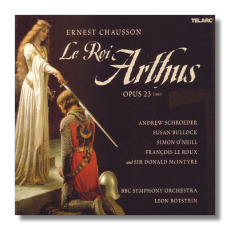
The Internet's Premier Classical Music Source
Related Links
- Chausson Reviews
- Latest Reviews
- More Reviews
-
By Composer
-
Collections
DVD & Blu-ray
Books
Concert Reviews
Articles/Interviews
Software
Audio
Search Amazon
Recommended Links
Site News
 CD Review
CD Review
Ernest Chausson

Le Roi Arthus, Op. 23
- Andrew Schroeder (Arthus)
- Susan Bullock (Genièvre)
- Simon O'Neill (Lancelot)
- François Le Roux (Merlin)
- Daniel Okulitch (Mordred)
- Garret Sorenson (Lyonnel)
- Donald McIntyre (Allan)
- Andrew Kennedy (Plowman)
Apollo Voices
BBC Symphony Orchestra/Leon Botstein
Telarc CD-80645 DDD 3CDs: 42:15, 62:17, 62:05
Chausson's opera is based on the legend of King Arthur – specifically, his noble character and spiritual idealism in the face of betrayal by his wife Guinevere and his friend Sir Lancelot. In terms of plot and music, it forms the third point of a triangle with Wagner's Tristan und Isolde and Debussy's Pelléas et Mélisande – a contemporary opera. Chausson spent much of his short life – he died in a bicycle accident when he was 44 – assimilating Wagner's music while trying not to imitate it. Furthermore, he and Debussy were close friends, and Debussy gave Chausson plenty of advice about Le Roi Arthus, among other things.
Arthus has been recorded before. There's a good recording conducted by Armin Jordan, and another I have not heard conducted by Marcello Viotti. I think Botstein's recording will be the one that gives this very distinguished opera the exposure which it deserves. It was recorded in late 2004 in collaboration with the BBC Symphony Orchestra and BBC Radio 3. Here's a conductor who, instead of recording another Beethoven Fifth or Ravel La valse, prefers to bring neglected music back into the spotlight. For Telarc, he already has recorded Richard Strauss's Die Ägyptische Helena and Die Liebe der Danae. What all three operas have in common is a harmonic and textural richness, not just in the vocal writing, but in the orchestra as well. (Perhaps to show his disapproval, Debussy made Pelléas into a cooler work.) One can understand Botstein's eagerness to wallow in Arthus. Aurally, it's almost fattening. His tempos are pretty much the same as Jordan's, but a little slower in Act Two.
Most of the singing on this set is very strong. Young baritone Andrew Schroeder has sung the title role in Brussels and New York City, and it sounds like he owns it. His is a gorgeous voice, and he uses it with eloquence and dignity. He is every inch a king. Simon O'Neill's voice is almost reedy enough to be authentically French, and he is mostly successful at coping with the score's Wagnerian demands without heaviness. At times, the tone curdles, but here's another singer who sounds committed and involved in his part, and who has a good grasp of the requisite style. The smaller parts are done with the same amount of care. The lower end of the vocal range is anchored by bass-baritone Donald McIntyre, who has been singing since the 1950s. The role of Allan, Guinevere's old squire, is a small one, but McIntyre makes an indelible impression anyway. Even Andrew Kennedy, in the role of the Plowman who sings an offstage song at the start of Act Two, makes magic. The role of Genièvre presents problems because of its tessitura. Bullock is not entirely successful with avoiding wobbling and harshness when her voice goes above the stave, but I can sympathize. Here's a role that calls for the stamina of Birgit Nilsson and the style of Mary Garden – a rare combination to be sure. Bullock doesn't ruin this recording, but she is the weak link among the principals. Both the orchestral and the choral work are fabulous, however. Telarc's engineering exceeds its high standards, and the booklet contains the French text, an English translation, three intelligent essays (including one by Botstein), a synopsis, and short cast bios.
Botstein will be conducting Paul Dukas's Ariane et Barbe-bleue at the New York City Opera in Fall 2005. Here's a post-Wagnerian opera cut from similar cloth as Arthus, and badly in need of a new recording. Here's hoping that Telarc will record that opera too, in New York or elsewhere.
Copyright © 2005, Raymond Tuttle




















